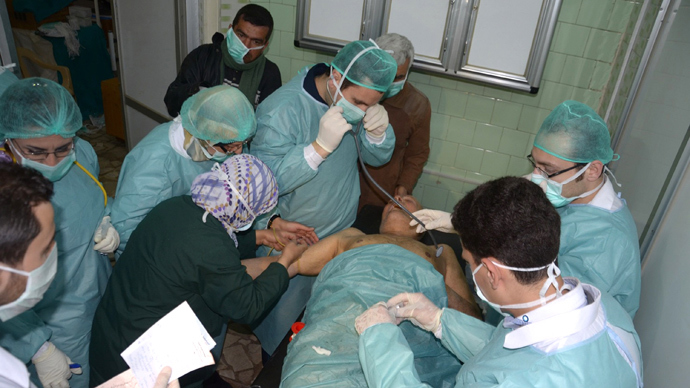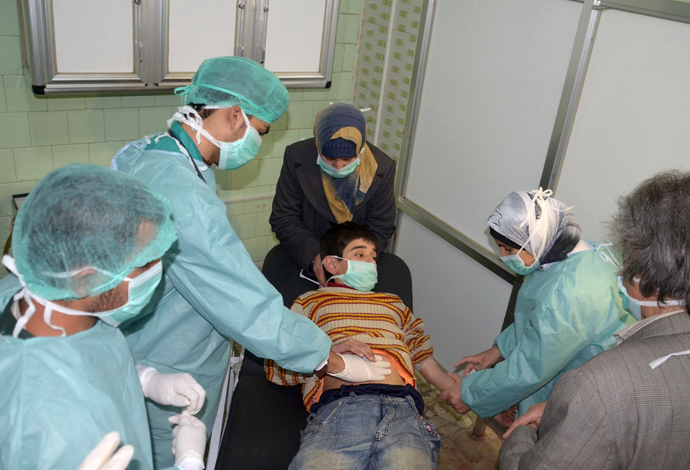Obama wags the dog over Syria chemical weapons

A team of Russian experts recently submitted reports to the UN detailing how chemical weapons used in Syria were not consistent with what the armed forces use, suggesting that rebels groups were responsible for the attack.
The Obama administration unwaveringly holds Bashar Assad’s forces
responsible for using sarin nerve gas against civilians, and is
now using these allegations to justify a military escalation of
the conflict.
When a crude chemical weapon containing sarin nerve gas killed 30
people after it was set off near Aleppo on March 19, the Syrian
government immediately called for an investigation into the
incident, prompting accusations and speculation from all sides.
President Obama immediately cast doubt over concerns that the
rebels could have been behind the attack and, despite the lack of
any compelling evidence, the US concluded in June that Syrian
government forces were the perpetrators.
The use of chemical weapons signified the crossing of Obama’s
much-touted ‘red line’ by government forces, prompting Washington
to announce that it would now openly supply the rebels with arms.
Meanwhile, Russia made it clear that they were not convinced by
Washington’s claims as prominent Russian political figures made
comparisons between Obama’s unverified claims of chemical weapons
in Syria and Bush’s fabricated claims of WMDs in Iraq.
The results of a test recently conducted by a Russian team
directly contradict US assertions that Assad used chemical
weapons. Russian experts claim that the missile used in the chemical weapons
attack was not factory made, and that the chemical components
found were not consistent with what the Syrian military uses.
Damascus initially asked the UN to investigate, but protested when Russian and Chinese experts were excluded from the investigation team over concerns of bias. Previous statements by Carla Del Ponte, head of a UN commission of inquiry that looked into the March 19 incident, suggested that the rebels used chemical weapons, not the Syrian government. The way the Syrian conflict is played out on the international stage displays the stranglehold that Washington enjoys over the United Nations, as investigation and testimony seen to be unfavorable to the US position has been suppressed, overlooked or outright blocked.

Why is the tail wagging the dog?
The fact that the Obama administration intends to overtly arm
non-state actors in Syria isn’t all that significant, given that
the CIA has covertly been syphoning arms to ‘moderates’
(non-cannibals presumably) for the greater duration of the
conflict. The White House has been trying to distance itself from
hardline jihadist brigades, which should be seen as completely
disingenuous, given that the biggest suppliers of arms to Syria
have been Saudi Arabia and Qatar, which are among the biggest
purchasers of American weapons – there is no way that Washington
can deny its hand in enabling terrorism in Syria.
The timing of Obama’s statement accusing Assad’s forces of using
chemical weapons begs comparison to the 1997 black comedy flick
‘Wag the Dog’, starring Robert De Niro and Dustin Hoffman.
The plot revolves around De Niro, a PR-spin doctor, and Hoffman,
a Hollywood director, who are tasked with channeling public
opinion away from a presidential sex scandal just days before
elections.
De Niro and Hoffman accomplish this by staging an entirely
fabricated war against Albania, playing up the “Albanian
threat” and the alleged crimes taking place there, which then
claim all the headlines and earn the president another term. In
other words, attention was diverted away from an issue of
significance to something entirely baseless and fabricated.
It’s no coincidence that Obama publicly charged Assad with using
chemical weapons in the fallout of the PRISM leaks and the
ongoing Edward Snowden saga, which continues to dominate
headlines, much to the embarrassment of the US. Those who have
been skeptical of the Russian position on Syria should ask
themselves, what does Assad have to gain from using chemical
weapons and crossing the proverbial red line?
On the other hand, do the rebels, who have used every opportunity to call for more foreign intervention and aid, have anything to gain from using chemical weapons? The answer is abundantly clear for anyone looking at the situation impartially.

Is there still hope for Geneva talks?
Russian Foreign Minister Sergey Lavrov hit the nail on the head
when he called for the US to either choose to stage a peace
conference or continue to channel arms to militants and non-state
actors in Syria – obviously, it cannot do both.
The possibility of peace talks between the Syrian government and
representatives of the fragmented array of armed groups is again
uncertain, as Moscow accuses Washington of encouraging the rebels
not to cooperate or negotiate. The situation on the ground in
Syria shows that Assad has claimed the upper hand, following the
recapturing of the strategic town of Qusair by government forces.
The recent resignation of Ghassan Hitto, the ‘interim prime
minister’ of the Syrian Opposition Coalition further illustrates
the ineptitude of the foreign-funded opposition, which has been
created solely to secure the interests of its US-Qatari-Saudi
sponsors in a post-Assad scenario.
In light of the changing situation on the ground, the US has
increased the number of combat-ready troops to almost 1,000 in
neighboring Jordan following an earlier announcement that it will
leave Patriot missiles and warplanes in the country.
Following the recent Russian studies of chemical weapons use by
the rebels, Damascus has invited chief UN chemical weapons
investigator Ake Sellstrom and UN disarmament chief Angela Kane
for talks following announcements that a rebel-linked storage
site containing copious amounts of dangerous chemicals had been
discovered.
It’s clear that Western-Gulf efforts to topple the government of Syria have been nearly exhausted, and as these parties get more desperate to bring about the outcome they would like to see, a final push into Syria can still be in the cards.
The only certainty at this point is that if peace talks ever come
to fruition, the catering company is going to have a difficult
time putting together a menu to appease the exotic taste buds of
those in the Farouq Brigade and their friends in the Al-Nusra
Front.
The statements, views and opinions expressed in this column are solely those of the author and do not necessarily represent those of RT.
The statements, views and opinions expressed in this column are solely those of the author and do not necessarily represent those of RT.













